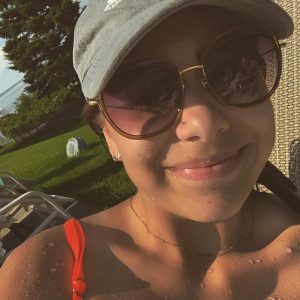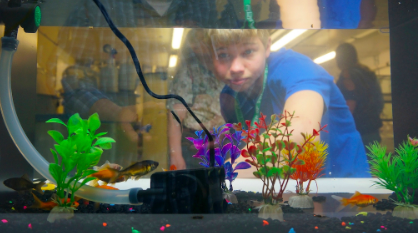ARI Extern Carli Spada Works with American Unagi, the Only Eel Farm in the U.S.
ARI Extern Carli Spada Works with American Unagi, the Only Eel Farm in the U.S.
Written by Meghan Nadzam

Glass eels– who would want to work with them? Probably someone who doesn’t find eels slimy, but “cute” instead. Carli Spada is that unique individual.
As a Marine Science major and Anthropology minor from Wilmington, MA, Spada never expected to find herself working in the field of aquaculture, but after becoming acquainted with such in her Animal Behavior class taught by Dr. Scarlett Tudor at UMaine, she became interested. Tudor suggested the Aquaculture Research Institute (ARI) externship to Spada as a way to get experience before graduating, so she now works for American Unagi, North America’s only eel farm.
You may be wondering: What does American Unagi do differently when it comes to eel farming?
Glass eels are the second stage in the American eel (Anguilla rostrata) life cycle. They start as planktonic larvae after hatching and grow into miniature transparent eels, hence the glass part of their name. Glass eels travel from estuaries to upstream parts of rivers like the Damariscotta River. Upstream in rivers of North America, they grow into adults, or silver eels, and migrate back downriver to marine waters such as the Sargasso Sea to spawn.
Most American eels eaten today are caught in Maine at the glass eel stage, raised in Asia and then sent around the world to get to consumers’ plates. To avoid worldwide transport and use of antibiotics or hormones, American Unagi raises the eels in Maine from glass eels to silver eels. American Unagi’s goal is to demonstrate that eels can be grown locally in land-based systems and sold in the U.S. Along with encouraging traceability in seafood, raising eels in Maine connects consumers with coastal communities that harvest them.

With support from students like Spada, American Unagi is one of the many aquaculture businesses benefiting from ARI’s externship. Students within and outside the UMaine community participate in the ARI externship program for 12 weeks and they are expected to complete a project as part of the experience. The student is assigned to work with an industry or non-profit host that is responsible for on-site job training, mentoring, and providing hands-on experience for the student.
The ARI externship funding comes from the U.S. Department of Agriculture (USDA) grant for the Sustainable Aquaculture Systems Supporting Atlantic Salmon project (SAS2). The SAS2 brings together several academic and federal research institutions with industry partners with a long term goal of supporting a sustainable land-based U.S. Atlantic salmon industry through research, education and extension. The externs this year are placed at land-based aquaculture facilities or in salmon-related research projects.
ARI externships like Spada’s create industry connections that help shape UMaine’s aquaculture outreach programming for all ages, from pre-K to senior citizens. UMaine’s two most popular virtual programs, the 4-H Aquarium Club and the 4-H Aquaponics Project, focus on teaching the skills sought by Maine’s aquaculture industry, skills that have been defined by these industry connections.
4-H Aquarium Club invites students 5-18 years old interested in aquaria life to a monthly meeting driven by the students who have questions about aquaculture and how to best care for their aquatic friends. 4-H Aquaponics Project is an experiential learning program for ages 9-18 years old teaching introductory aquaponic systems and design, fish husbandry, aquaponic gardening, record-keeping, problem-solving, food safety, teamwork, science and math literacy.

Both programs are organized by ARI Education and Outreach Coordinator, Dr. Scarlett Tudor and Center for Cooperative Aquaculture Research (CCAR)’s Aquaculture Research and Education Program Coordinator, Melissa Malmstedt.
“I think one of the most important things about our outreach program is that we are giving people multiple entry points and multiple ways of interaction. Not every learner is the same. Not every adult is going to listen to another adult, but if their kids are into it, then they may open up,” Tudor says.
The lessons taught in each program can come from companies like American Unagi, and that’s where Spada’s involvement begins.
Spada’s work focuses on creating informational pamphlets for outreach programs like those in 4-H that describe what American Unagi does to fuel the aquaculture and eel farming industries.
Spada’s externship involves caring for the eels themselves. To maintain the eels, Spada feeds them daily, sweeps debris from the bottom of the tanks, and then tests the water quality for levels of nitrate, nitrite, ammonia, salinity, and pH. Such skills are also taught in the 4-H programs.
“I did find a new fascination in aquaculture,” Spada says. “It’s very cool that I get to work in the only eel farm in the United States. Eels are probably a new interest for me as well.”
After Spada’s externship ends, the 4-H programs will continue its workforce development efforts using the resources she helped create. Spada will return to University of Maine to begin her senior year this fall. After that, her future is wide open.
“It’s quite possible I will go back to American Unagi after graduation,” Spada says.

